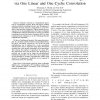Free Online Productivity Tools
i2Speak
i2Symbol
i2OCR
iTex2Img
iWeb2Print
iWeb2Shot
i2Type
iPdf2Split
iPdf2Merge
i2Bopomofo
i2Arabic
i2Style
i2Image
i2PDF
iLatex2Rtf
Sci2ools
119
click to vote
ARITH
2005
IEEE
2005
IEEE
Fast Modular Reduction for Large Wordlengths via One Linear and One Cyclic Convolution
Abstract— Modular reduction is a fundamental operation in cryptographic systems. Most well known modular reduction methods including Barrett’s and Montgomery’s algorithms leverage some-pre computations to avoid divisions so that the main complexity of these methods lies in a sequence of two long multiplications. For large wordlengths a multiplication which is tantamount to a linear convolution is performed via the Fast Fourier Transform (FFT) or other transform-based techniques as in the Schonhage-Strassen multiplication algorithm. We show a fundamental property (the separation principle): in a modular reduction based on long multiplications, the linear convolution required by one of the two long multiplications can be replaced by a cyclic convolution, and the halves can be separated using other information available due to the intrinsic redundancy of the operations. This reduces the number of operations by about 25%. We demonstrate that both Barrett’s and Montgomery’s method...
| Added | 24 Jun 2010 |
| Updated | 24 Jun 2010 |
| Type | Conference |
| Year | 2005 |
| Where | ARITH |
| Authors | Dhananjay S. Phatak, Tom Goff |
Comments (0)

